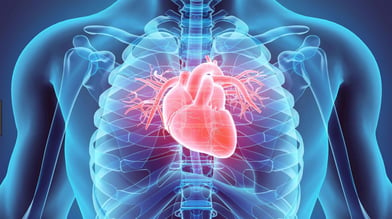 Cardiovascular diseases involve the blood vessels, the heart, or both. The cardiovascular or circulatory system supplies the body with blood. It consists of the heart, arteries, veins, and capillaries. There are several types of cardiovascular disease, but treatment, symptoms, and prevention often overlap.
Cardiovascular diseases involve the blood vessels, the heart, or both. The cardiovascular or circulatory system supplies the body with blood. It consists of the heart, arteries, veins, and capillaries. There are several types of cardiovascular disease, but treatment, symptoms, and prevention often overlap.Options include: lifestyle adaptations, such as weight control, exercise, quitting smoking, and dietary changes, medication, surgery, such as coronary artery bypass grafting, cardiac rehabilitation, including exercise and counseling.
Treatment aims to relieve symptoms, reduce the risk of the condition recurring or worsening and prevent complications.
Symptoms
There are many different types of cardiovascular disease. Symptoms will vary, depending on the specific type of disease a patient has.
However, typical symptoms of an underlying cardiovascular issue include:
- pains or pressure in the chest, which may indicate angina
- pain or discomfort in the arms, the left shoulder, elbows, jaw, or back
- shortness of breath, also known as dyspnea
- nausea and fatigue
- light-headed or faint
- cold sweat
Noteworthy: What Are The Major Risk Factors For Heart Disease
Noteworthy: How Stress Influences Your Risk For Heart Disease and Stroke
Noteworthy: Tips For A Diabetes Management Plan
Risk factors
Researchers from the Northwestern University Feinberg School of Medicine reported in JAMA that the lifetime risk for cardiovascular disease is more than 50 percent for both men and women. They added that even among those with few or no cardiovascular risk factors, the risk is still more than 30 percent.
Risk factors associated with cardiovascular disease include:
- high blood pressure (hypertension)
- smoking
- lack of sleep
- high blood cholesterol
- diabetes
- diets that are high in fat combined with carbohydrates
- physical inactivity
- drinking too much alcohol
- stress
- air pollution
Important causes of cardiovascular disease include atherosclerosis, when fatty deposits accumulate in the arteries.
Damage to the circulatory system can also result from diabetes and as the result of other health conditions, such as a virus, an infection, or a structural problem that the person was born with.
It often involves high blood pressure, but this can be both a cause and a result of cardiovascular disease.
Prevention
The majority of cardiovascular diseases are preventable. It is important to address risk factors by:
- consuming less alcohol and tobacco
- eating fresh fruit and vegetables
- reducing salt intake
- avoiding sedentary lifestyles, particularly among children
Children who eat a lot of salt have a much higher risk of hypertension when they are adults, as well as heart disease and stroke. Parents should also keep a close eye on how much saturated fat and sugar a child consumes.

